Premium
To save Sh300bn, Ruto must deal graft a death blow

President William Ruto.
President William Ruto struck the right tone during his first address of the joint Parliament – stately but realistic. That is to say that he sketched the contours of a country in dire straits economically and outlined tough measures that he hopes will start resuscitating the economy and place the country firmly on a recovery path.
He proposed several things but a few will stand out. Perhaps the most prominent is the order given to Treasury to cut spending by a hefty Sh300 billion from this year’s budget. Ideally, the first place Treasury should be looking at is the excessive spending within the government on completely unnecessary products and services. Or paying bills that are insanely inflated.
As a start, the President and the Opposition leader in Parliament should lead members to agree to the slightly scaled-down allowances that have been recommended for them. The country expects the debate about these allowances to be in Parliament very soon if the sour mood the MPs displayed a couple of days ago during their induction is anything to go by.
They threatened the chair of the Salaries and Remuneration Commission that they could retaliate against her and her commission unless the decision on their allowances, which is already gazetted, is not reversed.
Austerity measures
The President must then order some serious austerity measures in all ministries and State agencies. We speak here with the knowledge that austerity orders have in the past come to nought. The last directive was actually given by the government in which he was the deputy president. For instance, caps that the engine capacity of cars that ministers drive should be much less than those of the fuel guzzlers we see breaking traffic rules every day remain meaningless.
That order should be enforced, accompanied by one that requires that ministers be at work when they should be working, and not follow the President around in large wasteful convoys. The President, in helping Treasury effect his order, should apply the rule book of the late Tanzania President John Pombe Magufuli who, in his first five years in power, applied cash-saving measures with extreme zeal.
Some of the measures he enforced included a ban on official meetings and conferences in hotels, reminding state officers that the government had more than enough meeting rooms and institutions that could host residential meetings. He curtailed unnecessary travel, severely reduced the size of government delegations to foreign meetings. A minister could typically be accompanied by an aide or two, and get support from the envoys working in those foreign countries.
He certainly could have frowned at the very large delegation that President Ruto travelled with to the United Nations General Assembly a few days ago. The late Magufuli barely travelled outside his country. The upshot of these measures is that Tanzania was able to fund a significant number of roads and constructed interchanges and by-passes to ease the notorious traffic jams within Dar es Salaam.
We have had very wasteful governments. Someone must urge the new ministers that there is nothing wrong with the furniture that their predecessors have been using or the cars that they have been driving. If we know our ministers well, millions may well be wasted on new (red) carpets, curtains and office furniture. They should be restrained.
Sh300 billion
Even with these measures, Sh300 billion is a lot of money and it will be impossible not to suspend some of the planned development initiatives. But the effect of that may be ameliorated if the government just became more efficient. Billions of shillings are usually paid out to service loans that have not even been drawn because of sloth at ministries. Officials do not read and take expected action at stipulated times, causing the public huge losses. Just by working efficiently, tens of billions will be saved.
Peculiarly, the President said very little about how the Sh2 billion lost every day due to corruption can be stemmed to contribute to the Sh300 billion. This is a serious omission on the part of a President of a country that is bleeding sackfuls of money through corruption.
He must not be coy about it as he must know that one of the more persistent criticisms against his presidential bid was that he could coddle corrupt people because he is a beneficiary of corruption.
He has denied this and he now has a chance to deal corruption a deadly blow. He must do that if he is to achieve the ambition of balancing the budget within the next three years. Cost cutting, efficient government, reduced corruption and more productivity is part of what it will take to put more cash in the pockets of Kenyans and restore hope in government.
(The writer, a former Chief Editor of the Nation Group, is now consulting. [email protected]; @TMshindi)





